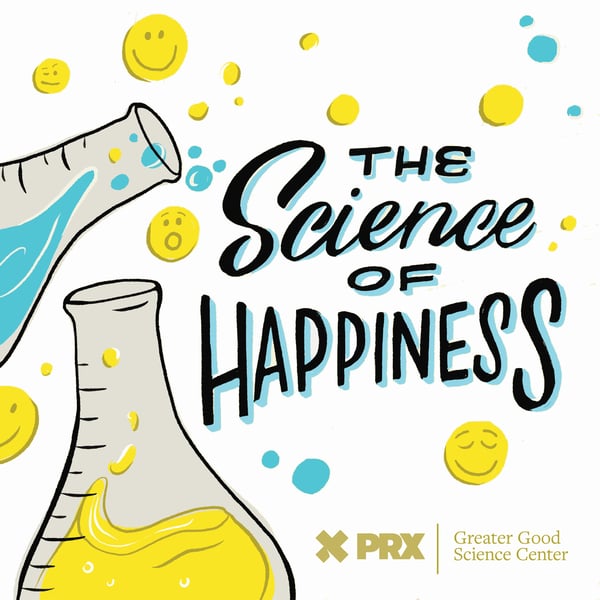Happiness Break: A Meditation on Pilina: Our Deep Interconnectedness, With Jo Qina'au
The Science of Happiness
PRX and Greater Good Science Center
4.4 • 1.9K Ratings
🗓️ 2 May 2024
⏱️ 10 minutes
🧾️ Download transcript
Summary
Pilina is an indigenous Hawaiian word, or concept, that describes our deep interconnectedness. Harvard Clinical Psychology Fellow Jo Qina'au guides us through a contemplation of our profound interrelationships.
Link to Episode Transcript: https://shorturl.at/npAM9
How to Do This Practice:
Pilina comes from the indigenous Hawaiian language and culture. Pilina means connection, or interconnectedness.
Settle into a comfortable position and observe your breath.
Visualize someone to whom you feel meaningfully connected and acknowledge the feeling of Pilina, or deep interconnectedness, between you two.
Reflect on what it is that connects you, what impact that connection has had on your life, and what it may have had on theirs.
Notice how it feels to acknowledge these things.
Repeat steps 2-4 with as many people as you wish.
Today’s Happiness Break host:
Jo Qina’au is an indigenous Hawaiian meditation teacher and a Clinical Psychology Fellow at Harvard Medical School.
Learn more about Jo’s work: https://tinyurl.com/2wfcma5f
Follow Jo on Instagram: https://tinyurl.com/3v8ubn6a
If you enjoyed this Happiness Break, you may also like these Happiness Breaks:
5 Minutes of Progressive Muscle Relaxation, With Jo Qina’au - https://tinyurl.com/4f3fd97f
Visualizing Your Best Self in Relationships, With Dacher Keltner - https://tinyurl.com/4dzpatx7
Check out these episodes of The Science of Happiness about connection:
How to Feel Less Lonely and More Connected - https://tinyurl.com/36t6urte
When It's Hard To Connect, Try Being Curious - https://tinyurl.com/3778r4h9
We love hearing from you! Tell us who you feel Pilina with, and what it means to you to reflect on it. Email us at [email protected] or use the hashtag #happinesspod.
Find us on Spotify: https://tinyurl.com/6s39rzus
Help us share Happiness Break! Rate us and copy and share this link: https://tinyurl.com/6s39rzus
We all could use a break to feel better. That's where Happiness Break comes in. In each biweekly podcast episode, instructors guide you through research-backed practices and meditations that you can do in real time. These relaxing and uplifting practices have been shown to help you cultivate calm, compassion, connection, mindfulness, and more — what the latest science says will directly support your well-being. All in less than ten minutes. A little break in your day.
Transcript
Click on a timestamp to play from that location
| 0:00.0 | Welcome to happiness break. I'm Dacker Keltner. This week we're taking a break to try a practice in connectedness. |
| 0:08.0 | Decades of research have shown that perhaps the biggest factor in our well-being is the quality of our |
| 0:14.6 | relationships and really relationships of all kinds. We know that strong |
| 0:19.0 | social connections makes us feel stronger, more optimistic, and more hopeful about what we're doing. |
| 0:24.8 | Thinking about our good relationships is also really important. |
| 0:27.8 | We know that reflecting and remembering the quality of our relationships activates the reward |
| 0:32.4 | centers in our brain that give us a greater |
| 0:34.5 | sense of delight, and it engages regions of the prefrontal cortex that help us handle |
| 0:39.5 | stress and respond to the difficulties of living with greater flexibility and |
| 0:43.7 | resilience. There's probably no better pathway to a good life than engaging in |
| 0:49.2 | and reflecting upon good healthy relationships. Guiding us today is Joe China Ow, a native Hawaiian |
| 0:55.6 | meditation teacher and clinical fellow at Harvard Medical School. They're also |
| 0:59.7 | the founder of Polina Center for Well Being. Here's Joe. |
| 1:07.0 | Aloha everyone. I am Joe China Ow. |
| 1:10.0 | I'm really excited to be sharing this meditation with y'all. It's a Pylina meditation and the word |
| 1:18.3 | Pylina comes from the native Hawaiian language. As Knaakamawli, Native Hawaiian language. |
| 1:22.8 | As Knaakamowale, Native Hawaiian, |
| 1:25.1 | I'm always really honored and happy to share about my culture. |
| 1:31.1 | Pylina means connection, and so we can think about Pylina as an interpersonal connection. |
| 1:38.6 | We're really going to explore that today that'll be our main focus. |
| 1:43.4 | But the word itself, Peely, is a kind of grass |
| 1:46.8 | that grows in Hawaii. |
... |
Please login to see the full transcript.
Disclaimer: The podcast and artwork embedded on this page are from PRX and Greater Good Science Center, and are the property of its owner and not affiliated with or endorsed by Tapesearch.
Generated transcripts are the property of PRX and Greater Good Science Center and are distributed freely under the Fair Use doctrine. Transcripts generated by Tapesearch are not guaranteed to be accurate.
Copyright © Tapesearch 2025.

